九年级英语上册Unit 5 Art world Period 2 Reading课件(共52张PPT)牛津译林版
文档属性
| 名称 | 九年级英语上册Unit 5 Art world Period 2 Reading课件(共52张PPT)牛津译林版 | 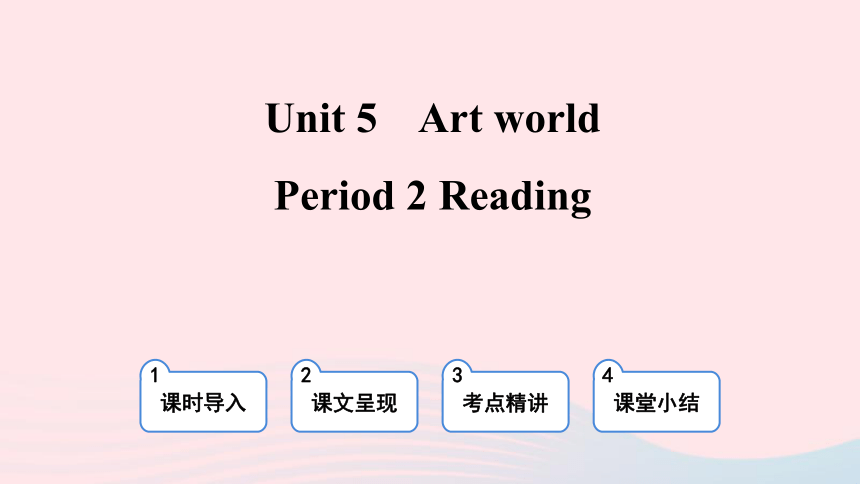 | |
| 格式 | pptx | ||
| 文件大小 | 3.8MB | ||
| 资源类型 | 教案 | ||
| 版本资源 | 牛津译林版 | ||
| 科目 | 英语 | ||
| 更新时间 | 2025-02-08 15:59:29 | ||
图片预览

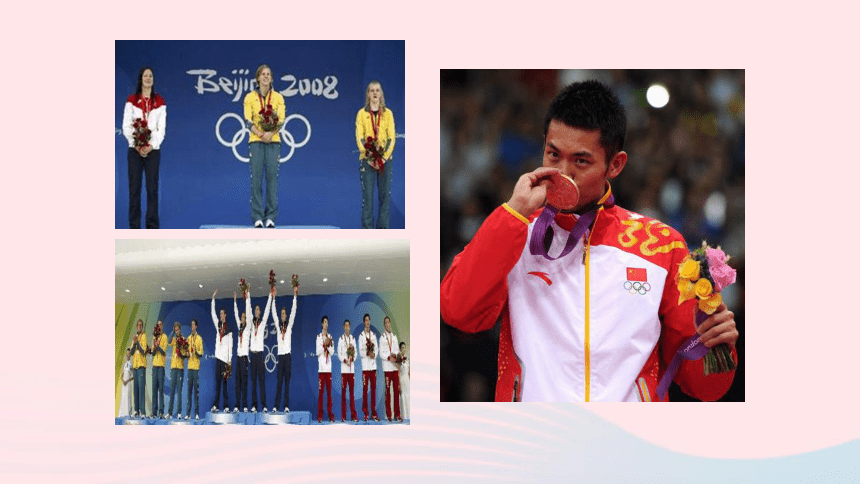
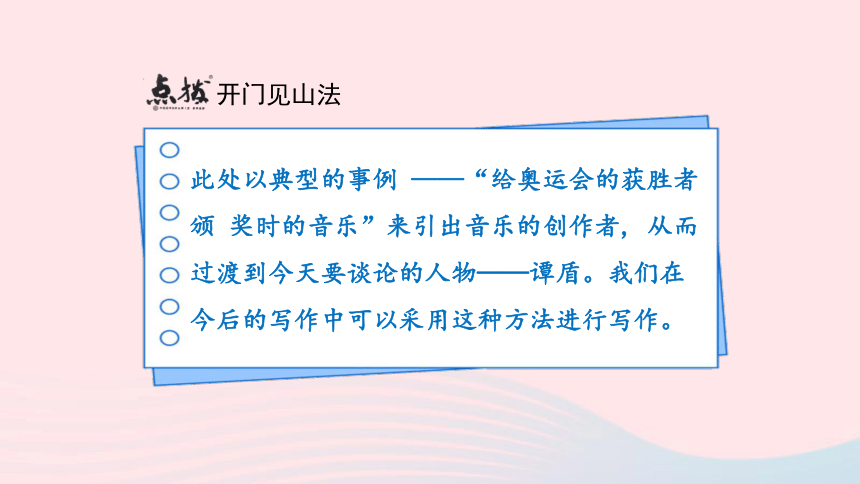
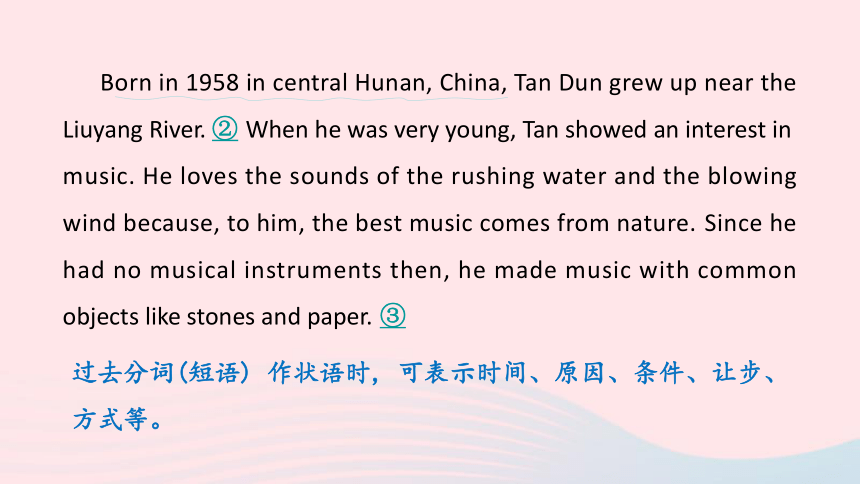

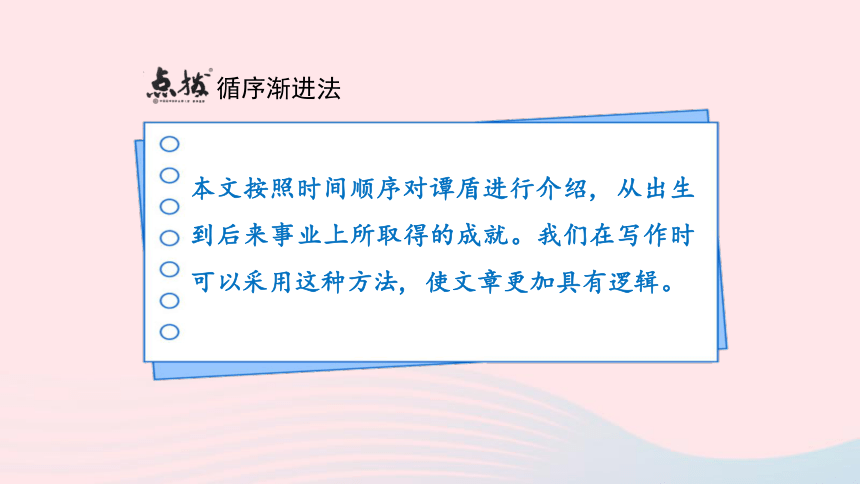
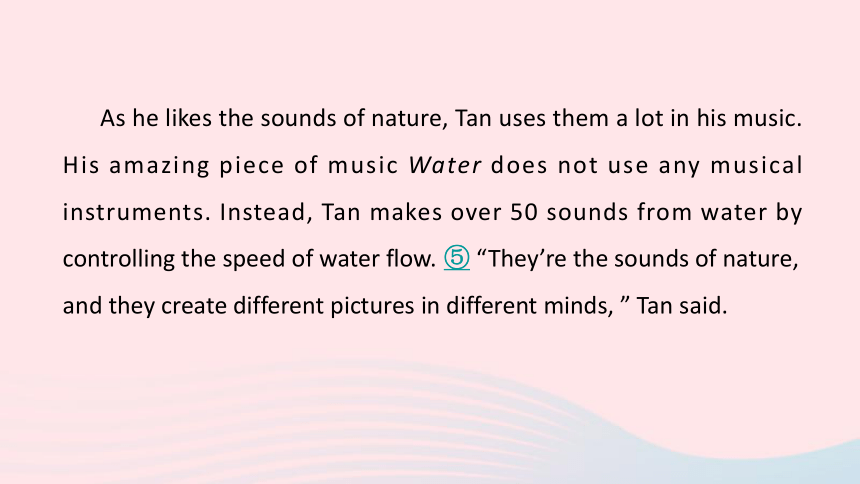
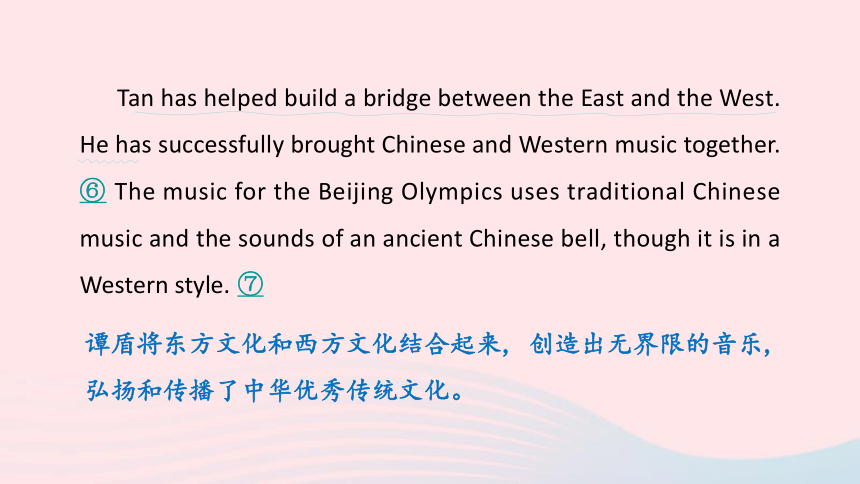
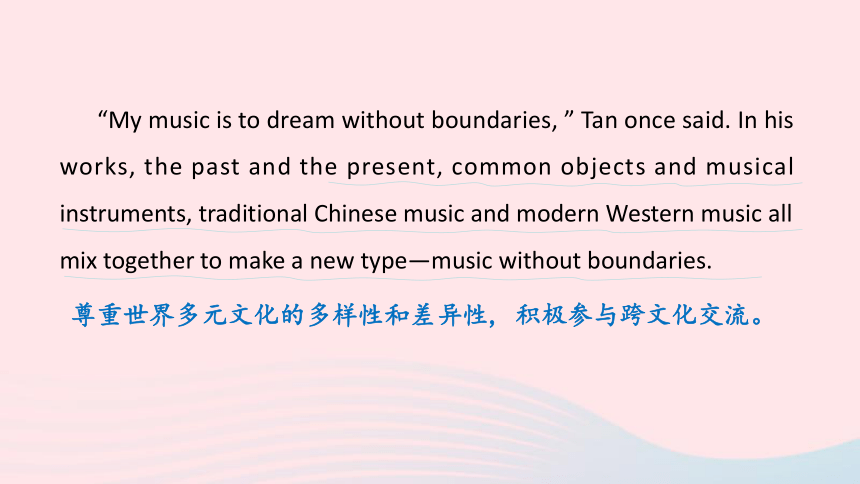
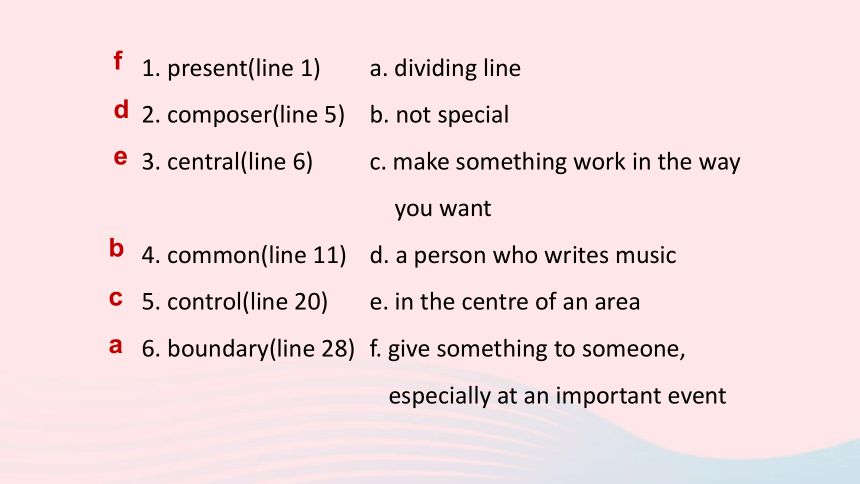
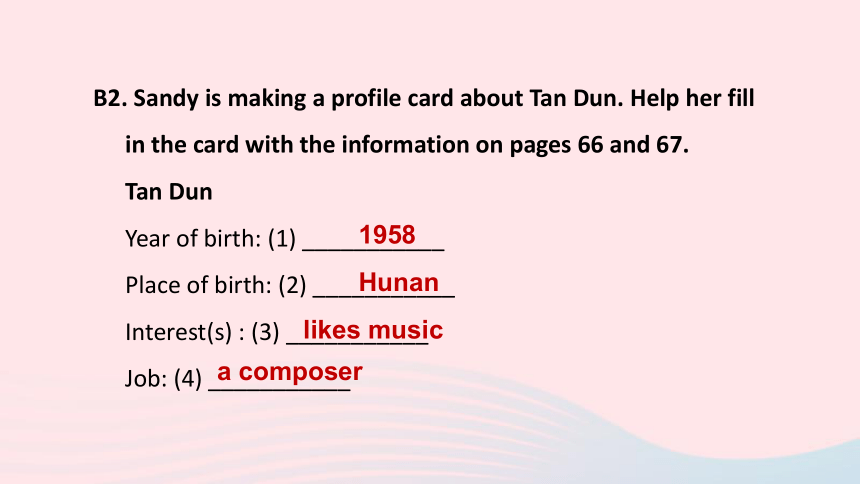
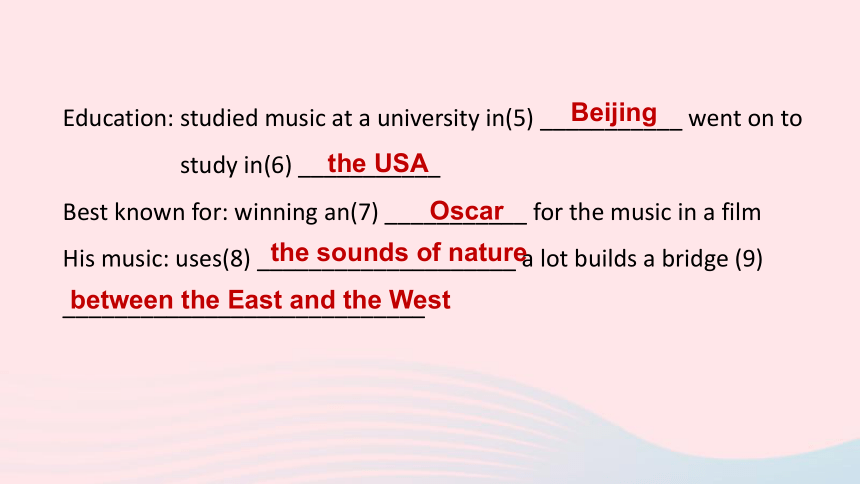
文档简介
(共52张PPT)
Unit 5 Art world
Period 2 Reading
1
课时导入
2
课文呈现
3
考点精讲
4
课堂小结
开门见山法
此处以典型的事例 ——“给奥运会的获胜者颁 奖时的音乐”来引出音乐的创作者, 从而过渡到今天要谈论的人物——谭盾。我们在今后的写作中可以采用这种方法进行写作。
Born in 1958 in central Hunan, China, Tan Dun grew up near the Liuyang River. ② When he was very young, Tan showed an interest in music. He loves the sounds of the rushing water and the blowing wind because, to him, the best music comes from nature. Since he had no musical instruments then, he made music with common objects like stones and paper. ③
过去分词(短语) 作状语时, 可表示时间、原因、条件、让步、方式等。
In 1978, Tan entered the Central Conservatory of Music in Beijing. Eight years later, he went on to study in the USA. There he got to know great musicians from around the world. As a composer, perhaps he is best known for winning an Oscar for his music in the film Crouching Tiger, Hidden Dragon. ④
循序渐进法
本文按照时间顺序对谭盾进行介绍, 从出生到后来事业上所取得的成就。我们在写作时可以采用这种方法, 使文章更加具有逻辑。
As he likes the sounds of nature, Tan uses them a lot in his music. His amazing piece of music Water does not use any musical instruments. Instead, Tan makes over 50 sounds from water by controlling the speed of water flow. ⑤ “They’re the sounds of nature, and they create different pictures in different minds, ” Tan said.
Tan has helped build a bridge between the East and the West. He has successfully brought Chinese and Western music together. ⑥ The music for the Beijing Olympics uses traditional Chinese music and the sounds of an ancient Chinese bell, though it is in a Western style. ⑦
谭盾将东方文化和西方文化结合起来, 创造出无界限的音乐, 弘扬和传播了中华优秀传统文化。
“My music is to dream without boundaries, ” Tan once said. In his works, the past and the present, common objects and musical instruments, traditional Chinese music and modern Western music all mix together to make a new type—music without boundaries.
尊重世界多元文化的多样性和差异性, 积极参与跨文化交流。
1. present(line 1) a. dividing line
2. composer(line 5) b. not special
3. central(line 6) c. make something work in the way
you want
4. common(line 11) d. a person who writes music
5. control(line 20) e. in the centre of an area
6. boundary(line 28) f. give something to someone,
especially at an important event
f
d
e
b
c
a
B2. Sandy is making a profile card about Tan Dun. Help her fill in the card with the information on pages 66 and 67.
Tan Dun
Year of birth: (1) ___________
Place of birth: (2) ___________
Interest(s) : (3) ___________
Job: (4) ___________
1958
Hunan
likes music
a composer
Education: studied music at a university in(5) ___________ went on to study in(6) ___________
Best known for: winning an(7) ___________ for the music in a film
His music: uses(8) ____________________ a lot builds a bridge (9) ____________________________
Beijing
the USA
Oscar
the sounds of nature
between the East and the West
B3. Sandy is talking with Daniel about Tan Dun. Complete their conversation with the information on pages 66 and 67.
Daniel: Tan Dun is one of the greatest(1) _________ in the world. Could you tell me more about him
Sandy: Sure. He wrote the(2) _________ music for the Beijing 2008 Olympic Games.
Daniel: I know he loves the sounds of(3) _________. Have they influenced his works
composers
award
nature
Sandy: Yes. He uses them a lot in his music, and in one of his works, Water, he doesn’t use any musical(4) __________.
Daniel: Really How does he make music, then
Sandy: He makes over 50 sounds from water by(5) ___________ the speed of water(6) _________.
Daniel: That’s really amazing!
Sandy: Yes. When he was young, he used to make music with(7) _________ objects like stones and paper.
instruments
controlling
flow
common
Daniel: Wow! His music for the Beijing Olympics must be very special!
Sandy: Yes. It uses(8) ______________ Chinese music and an(9) _________ Chinese bell, but it’s in a (10) _________ style.
traditional
ancient
Western
B4. What does Tan Dun mean by saying that “My music is to dream without boundaries” Give examples if necessary.
He mixes different types of music together, such as the past and the present, common objects and musical instruments, traditional Chinese music and modern Western music. For example, he has successfully brought Chinese and Western music together. The music for the Beijing Olympics uses traditional Chinese music and the sounds of an ancient Chinese bell, though it is in a Western style.
(高频) present /pr 'zent/ vt. 颁发; 提交
作动词, present sth. to sb. = present sb. with sth. 将某物颁发给某人。
考点1
考向
知识点
1
Each time a medal was presented to a winner...
present 的其他用法
① 礼物(cn. )
② 现在(at present目前)
出席;存在;现存的
n.
adj.
e.g. Michael presented an application to the manager.
迈克尔向经理提交了一份申请。
On his retirement, colleagues presented him with a set of golf clubs.
在他退休之际, 同事们赠给他一套高尔夫球杆。
He gave me a present. 他给了我一份礼物。
I am very pleased with my present job.
我对我现在的工作很满意。
n.礼物,礼品
adj.当前的
一语辨异
Our headmaster presented each person present with a book as a present.
我们的校长给每位出席的人赠送了一本书作为礼物。
考题1:The Annual People Award is _______ to people who have warmed our hearts with their actions.
A. presented B. prepared
C. produced D. provided
A
【点拨】本题用词义辨析法。presented 颁发; prepared准备; produced 产生; provided 提供。由“The Annual People Award is... to people...”可知, 此处指颁奖, sth. Be presented to sb. “将某物颁发给某人”。
winner /'w n (r)/ n. 获胜者
e.g. Who’s the winner of the tennis match
这次网球赛的获胜者是谁?
It was a tough fight. But finally Lupe won the most marbles and became the winner!
这是一场艰苦的战斗。但是最后卢佩赢得了最多的弹珠, 成为了赢家!
考点2
winner 由动词win 双写“n”加后缀“-er”构成,通常指比赛或竞赛中的获胜者,也指经过努力的成功者。
考题2:[百色] It’s such an exciting match that all the players should be regarded as __________(win).
【点拨】be regarded as 表示“被视为, 被认为”, 后接名词, win 的名词为winner“获胜者”; 由“all the players”可推断此处的winner 应用复数。
winners
返回
温馨提示:可返回原文
central /'sentr l/ adj. 中心的, 中央的
e.g. She stays in a small hotel near Central Park.
她住在中央公园附近的一家小旅馆。
a long table in the centre of the room
房间中央的长桌
考点3
知识点
2
Born in 1958 in central Hunan, China, Tan Dun
grew up near the Liuyang River.
centre 作名词,意为“中心, 中央”。in the centre of在……的中心
返回
(高频) common /'k m n/ adj. 常见的, 一般的, 普通的
考点4
知识点
3
..., he made music with common objects like
stones and paper.
反义词为uncommon,意为“不常有的,罕见的”。common knowledge 常识
辨析:common, ordinary 与usual
common “常见的, 一般的”, 多用于指物, 侧重表达很常见, 不稀奇, 反义词为uncommon。
ordinary “普通的, 平凡的”, 指物时, 表示每天发生或十分平淡无奇; 指人时, 表示无特别之处, 很一般。
usual “惯常的, 通常的”, 指常见常闻和常做的事或举动。
e.g. We have common topics to talk about.
我们有共同的话题可谈。
He is an ordinary man.
他是一个普通的男人。
We will meet at the usual time.
我们将在老时间见面。
拓展:common 还可作名词, 意为“公共用地; 公地”。
考题3:[宿迁] While Tan Dun was young, he once made music with _________________ (not special) objects like stones and paper.
common/ordinary
返回
(高频) be known for... 因……而著名
e.g. The city is known for its numerous neon lights.
这座城市以其众多的霓虹灯而闻名。
Spain used to be famous for its strong armada.
西班牙曾以其强大的舰队而著名。
考点5
知识点
4
As a composer, perhaps he is best known for winning an
Oscar for his music in the film Crouching Tiger, Hidden Dragon.
It is known as the “Oriental Houston”.
它被称为“东方休斯顿”。
As is known to all, shouting and running are not allowed in most museums.
众所周知, 大多数博物馆都不允许喊叫和奔跑。
辨析:be known/famous for, be known/famous as 与be known to
be known/famous for 因……而著名, 其后所接内容表示某人或物的特点、特长等。
be known/famous as 作为……而著名, 其后的名词表示一个人的身份、职业等。
be known to 为……所了解/ 知道, 其后接表示人的词语。
考题4:[常州二模] 自去年以来, 我们小区就以其开阔的空间和优美的环境而闻名。(汉译英)
Our community ___________________________________
____________________________________ since last year.
has been famous/known for its open
space and beautiful environment
返回
control /k n'tr l/ vt. 控制; 支配
e.g. The firemen were unable to control the big fire.
消防队员无法控制这场大火。
He controlled himself. 他控制住了自己。
考点6
知识点
5
Instead, Tan makes over 50 sounds from water by
controlling the speed of water flow.
拓展:control 还可作名词, 意为“控制(能力) , 支配(能力) ”。
e.g. He lost control of his car. 他失去了对他车的控制。
control 作名词的常见搭配
① be under control 处于控制之下
② be out of control 失去控制
③ be in control of 管理,控制
过去式/过去分词为controlled,动名词为 controlling
考题5:[无锡] The situation won’t be out of _________ (控制). The worst is behind us.
control
by doing sth. 通过做某事
e.g. He succeeded by working hard.
他通过努力工作而成功。
考点7
特别解读
by 是介词,用来表示方法、手段、方式,意为“凭借;靠;用;通过”,后接名词或动词的-ing 形式。
拓展:by 的其他用法归纳:
用法 例句
表示静态的位置, 意为“靠近; 在……旁边”。 e.g. He stands by the river.
他站在河边。
表示动态的位置, 意为“从……旁边经过”。 e.g. He passed by me without greeting me.
他从我身边走过, 但没和我打招呼。
用法 例句
表示时间, 意为“不迟于; 在……之前”。 e.g. They will be back by six.
他们将在6 点之前回来。
表示“逐一”之意, 常用于短语中。 e.g. step by step 一步一步地
day by day 逐日地
little by little 一点一点地
by+ 交通工具, 表示乘坐某种交通工具。 e.g. I often go to school by bus.
我经常乘公共汽车去上学。
考题6:[ 抚顺] Amy wants to be a good learner _______ practicing more.
A. by B. for C. on D. with
【点拨】根据“to be a good learner”可知要通过更多的练习才能成为一个好的学习者, 因此应用介词by。by doing sth. 表示“通过做某事”。
A
返回
successfully /s k'sesf li/ adv. 成功地
e.g. At last he successfully solved the problem.
最后他成功地解决了这个问题。
考点8
知识点
6
He has successfully brought Chinese and Western
music together.
success 的词形变化
successful adj. 成功的
success n. 成功;成功的人或事
succeed v. 成功
考题7:Thanks for your kindness. Perhaps I can do it _____________ (成功地) with your help.
【点拨】根据提示“成功地”可知, 这里修饰动词do, 用副词successfully。
successfully
返回
(高频) though / / conj. 虽然; 尽管
e.g. He went to school, though he was ill.
尽管他生病了, 但他还是去上学了。
考点9
知识点
7
The music for the Beijing Olympics uses traditional
Chinese music and the sounds of an ancient Chinese
bell, though it is in a Western style.
though 常用于引导让步状语从句,可与although互换,但不能与but 同时使用,但可与yet,still连用。
拓展:though 还可用作副词, 意为“可是; 不过; 然而”, 用在句末, 进行补充说明。
e.g. He’ll probably say no. It’s worth asking though.
他很可能会拒绝。不过还是值得一问。
考题8:[徐州] Dad sometimes goes to the supermarket with us _______ he hates going shopping.
A. because B. so
C. though D. if
C
返回
本节课主要学习了:
重点单词:present , winner , central , instrument ……
重点短语:dividing line, be known/famous for……
知识是力量,
梦想是翅膀。
Unit 5 Art world
Period 2 Reading
1
课时导入
2
课文呈现
3
考点精讲
4
课堂小结
开门见山法
此处以典型的事例 ——“给奥运会的获胜者颁 奖时的音乐”来引出音乐的创作者, 从而过渡到今天要谈论的人物——谭盾。我们在今后的写作中可以采用这种方法进行写作。
Born in 1958 in central Hunan, China, Tan Dun grew up near the Liuyang River. ② When he was very young, Tan showed an interest in music. He loves the sounds of the rushing water and the blowing wind because, to him, the best music comes from nature. Since he had no musical instruments then, he made music with common objects like stones and paper. ③
过去分词(短语) 作状语时, 可表示时间、原因、条件、让步、方式等。
In 1978, Tan entered the Central Conservatory of Music in Beijing. Eight years later, he went on to study in the USA. There he got to know great musicians from around the world. As a composer, perhaps he is best known for winning an Oscar for his music in the film Crouching Tiger, Hidden Dragon. ④
循序渐进法
本文按照时间顺序对谭盾进行介绍, 从出生到后来事业上所取得的成就。我们在写作时可以采用这种方法, 使文章更加具有逻辑。
As he likes the sounds of nature, Tan uses them a lot in his music. His amazing piece of music Water does not use any musical instruments. Instead, Tan makes over 50 sounds from water by controlling the speed of water flow. ⑤ “They’re the sounds of nature, and they create different pictures in different minds, ” Tan said.
Tan has helped build a bridge between the East and the West. He has successfully brought Chinese and Western music together. ⑥ The music for the Beijing Olympics uses traditional Chinese music and the sounds of an ancient Chinese bell, though it is in a Western style. ⑦
谭盾将东方文化和西方文化结合起来, 创造出无界限的音乐, 弘扬和传播了中华优秀传统文化。
“My music is to dream without boundaries, ” Tan once said. In his works, the past and the present, common objects and musical instruments, traditional Chinese music and modern Western music all mix together to make a new type—music without boundaries.
尊重世界多元文化的多样性和差异性, 积极参与跨文化交流。
1. present(line 1) a. dividing line
2. composer(line 5) b. not special
3. central(line 6) c. make something work in the way
you want
4. common(line 11) d. a person who writes music
5. control(line 20) e. in the centre of an area
6. boundary(line 28) f. give something to someone,
especially at an important event
f
d
e
b
c
a
B2. Sandy is making a profile card about Tan Dun. Help her fill in the card with the information on pages 66 and 67.
Tan Dun
Year of birth: (1) ___________
Place of birth: (2) ___________
Interest(s) : (3) ___________
Job: (4) ___________
1958
Hunan
likes music
a composer
Education: studied music at a university in(5) ___________ went on to study in(6) ___________
Best known for: winning an(7) ___________ for the music in a film
His music: uses(8) ____________________ a lot builds a bridge (9) ____________________________
Beijing
the USA
Oscar
the sounds of nature
between the East and the West
B3. Sandy is talking with Daniel about Tan Dun. Complete their conversation with the information on pages 66 and 67.
Daniel: Tan Dun is one of the greatest(1) _________ in the world. Could you tell me more about him
Sandy: Sure. He wrote the(2) _________ music for the Beijing 2008 Olympic Games.
Daniel: I know he loves the sounds of(3) _________. Have they influenced his works
composers
award
nature
Sandy: Yes. He uses them a lot in his music, and in one of his works, Water, he doesn’t use any musical(4) __________.
Daniel: Really How does he make music, then
Sandy: He makes over 50 sounds from water by(5) ___________ the speed of water(6) _________.
Daniel: That’s really amazing!
Sandy: Yes. When he was young, he used to make music with(7) _________ objects like stones and paper.
instruments
controlling
flow
common
Daniel: Wow! His music for the Beijing Olympics must be very special!
Sandy: Yes. It uses(8) ______________ Chinese music and an(9) _________ Chinese bell, but it’s in a (10) _________ style.
traditional
ancient
Western
B4. What does Tan Dun mean by saying that “My music is to dream without boundaries” Give examples if necessary.
He mixes different types of music together, such as the past and the present, common objects and musical instruments, traditional Chinese music and modern Western music. For example, he has successfully brought Chinese and Western music together. The music for the Beijing Olympics uses traditional Chinese music and the sounds of an ancient Chinese bell, though it is in a Western style.
(高频) present /pr 'zent/ vt. 颁发; 提交
作动词, present sth. to sb. = present sb. with sth. 将某物颁发给某人。
考点1
考向
知识点
1
Each time a medal was presented to a winner...
present 的其他用法
① 礼物(cn. )
② 现在(at present目前)
出席;存在;现存的
n.
adj.
e.g. Michael presented an application to the manager.
迈克尔向经理提交了一份申请。
On his retirement, colleagues presented him with a set of golf clubs.
在他退休之际, 同事们赠给他一套高尔夫球杆。
He gave me a present. 他给了我一份礼物。
I am very pleased with my present job.
我对我现在的工作很满意。
n.礼物,礼品
adj.当前的
一语辨异
Our headmaster presented each person present with a book as a present.
我们的校长给每位出席的人赠送了一本书作为礼物。
考题1:The Annual People Award is _______ to people who have warmed our hearts with their actions.
A. presented B. prepared
C. produced D. provided
A
【点拨】本题用词义辨析法。presented 颁发; prepared准备; produced 产生; provided 提供。由“The Annual People Award is... to people...”可知, 此处指颁奖, sth. Be presented to sb. “将某物颁发给某人”。
winner /'w n (r)/ n. 获胜者
e.g. Who’s the winner of the tennis match
这次网球赛的获胜者是谁?
It was a tough fight. But finally Lupe won the most marbles and became the winner!
这是一场艰苦的战斗。但是最后卢佩赢得了最多的弹珠, 成为了赢家!
考点2
winner 由动词win 双写“n”加后缀“-er”构成,通常指比赛或竞赛中的获胜者,也指经过努力的成功者。
考题2:[百色] It’s such an exciting match that all the players should be regarded as __________(win).
【点拨】be regarded as 表示“被视为, 被认为”, 后接名词, win 的名词为winner“获胜者”; 由“all the players”可推断此处的winner 应用复数。
winners
返回
温馨提示:可返回原文
central /'sentr l/ adj. 中心的, 中央的
e.g. She stays in a small hotel near Central Park.
她住在中央公园附近的一家小旅馆。
a long table in the centre of the room
房间中央的长桌
考点3
知识点
2
Born in 1958 in central Hunan, China, Tan Dun
grew up near the Liuyang River.
centre 作名词,意为“中心, 中央”。in the centre of在……的中心
返回
(高频) common /'k m n/ adj. 常见的, 一般的, 普通的
考点4
知识点
3
..., he made music with common objects like
stones and paper.
反义词为uncommon,意为“不常有的,罕见的”。common knowledge 常识
辨析:common, ordinary 与usual
common “常见的, 一般的”, 多用于指物, 侧重表达很常见, 不稀奇, 反义词为uncommon。
ordinary “普通的, 平凡的”, 指物时, 表示每天发生或十分平淡无奇; 指人时, 表示无特别之处, 很一般。
usual “惯常的, 通常的”, 指常见常闻和常做的事或举动。
e.g. We have common topics to talk about.
我们有共同的话题可谈。
He is an ordinary man.
他是一个普通的男人。
We will meet at the usual time.
我们将在老时间见面。
拓展:common 还可作名词, 意为“公共用地; 公地”。
考题3:[宿迁] While Tan Dun was young, he once made music with _________________ (not special) objects like stones and paper.
common/ordinary
返回
(高频) be known for... 因……而著名
e.g. The city is known for its numerous neon lights.
这座城市以其众多的霓虹灯而闻名。
Spain used to be famous for its strong armada.
西班牙曾以其强大的舰队而著名。
考点5
知识点
4
As a composer, perhaps he is best known for winning an
Oscar for his music in the film Crouching Tiger, Hidden Dragon.
It is known as the “Oriental Houston”.
它被称为“东方休斯顿”。
As is known to all, shouting and running are not allowed in most museums.
众所周知, 大多数博物馆都不允许喊叫和奔跑。
辨析:be known/famous for, be known/famous as 与be known to
be known/famous for 因……而著名, 其后所接内容表示某人或物的特点、特长等。
be known/famous as 作为……而著名, 其后的名词表示一个人的身份、职业等。
be known to 为……所了解/ 知道, 其后接表示人的词语。
考题4:[常州二模] 自去年以来, 我们小区就以其开阔的空间和优美的环境而闻名。(汉译英)
Our community ___________________________________
____________________________________ since last year.
has been famous/known for its open
space and beautiful environment
返回
control /k n'tr l/ vt. 控制; 支配
e.g. The firemen were unable to control the big fire.
消防队员无法控制这场大火。
He controlled himself. 他控制住了自己。
考点6
知识点
5
Instead, Tan makes over 50 sounds from water by
controlling the speed of water flow.
拓展:control 还可作名词, 意为“控制(能力) , 支配(能力) ”。
e.g. He lost control of his car. 他失去了对他车的控制。
control 作名词的常见搭配
① be under control 处于控制之下
② be out of control 失去控制
③ be in control of 管理,控制
过去式/过去分词为controlled,动名词为 controlling
考题5:[无锡] The situation won’t be out of _________ (控制). The worst is behind us.
control
by doing sth. 通过做某事
e.g. He succeeded by working hard.
他通过努力工作而成功。
考点7
特别解读
by 是介词,用来表示方法、手段、方式,意为“凭借;靠;用;通过”,后接名词或动词的-ing 形式。
拓展:by 的其他用法归纳:
用法 例句
表示静态的位置, 意为“靠近; 在……旁边”。 e.g. He stands by the river.
他站在河边。
表示动态的位置, 意为“从……旁边经过”。 e.g. He passed by me without greeting me.
他从我身边走过, 但没和我打招呼。
用法 例句
表示时间, 意为“不迟于; 在……之前”。 e.g. They will be back by six.
他们将在6 点之前回来。
表示“逐一”之意, 常用于短语中。 e.g. step by step 一步一步地
day by day 逐日地
little by little 一点一点地
by+ 交通工具, 表示乘坐某种交通工具。 e.g. I often go to school by bus.
我经常乘公共汽车去上学。
考题6:[ 抚顺] Amy wants to be a good learner _______ practicing more.
A. by B. for C. on D. with
【点拨】根据“to be a good learner”可知要通过更多的练习才能成为一个好的学习者, 因此应用介词by。by doing sth. 表示“通过做某事”。
A
返回
successfully /s k'sesf li/ adv. 成功地
e.g. At last he successfully solved the problem.
最后他成功地解决了这个问题。
考点8
知识点
6
He has successfully brought Chinese and Western
music together.
success 的词形变化
successful adj. 成功的
success n. 成功;成功的人或事
succeed v. 成功
考题7:Thanks for your kindness. Perhaps I can do it _____________ (成功地) with your help.
【点拨】根据提示“成功地”可知, 这里修饰动词do, 用副词successfully。
successfully
返回
(高频) though / / conj. 虽然; 尽管
e.g. He went to school, though he was ill.
尽管他生病了, 但他还是去上学了。
考点9
知识点
7
The music for the Beijing Olympics uses traditional
Chinese music and the sounds of an ancient Chinese
bell, though it is in a Western style.
though 常用于引导让步状语从句,可与although互换,但不能与but 同时使用,但可与yet,still连用。
拓展:though 还可用作副词, 意为“可是; 不过; 然而”, 用在句末, 进行补充说明。
e.g. He’ll probably say no. It’s worth asking though.
他很可能会拒绝。不过还是值得一问。
考题8:[徐州] Dad sometimes goes to the supermarket with us _______ he hates going shopping.
A. because B. so
C. though D. if
C
返回
本节课主要学习了:
重点单词:present , winner , central , instrument ……
重点短语:dividing line, be known/famous for……
知识是力量,
梦想是翅膀。
